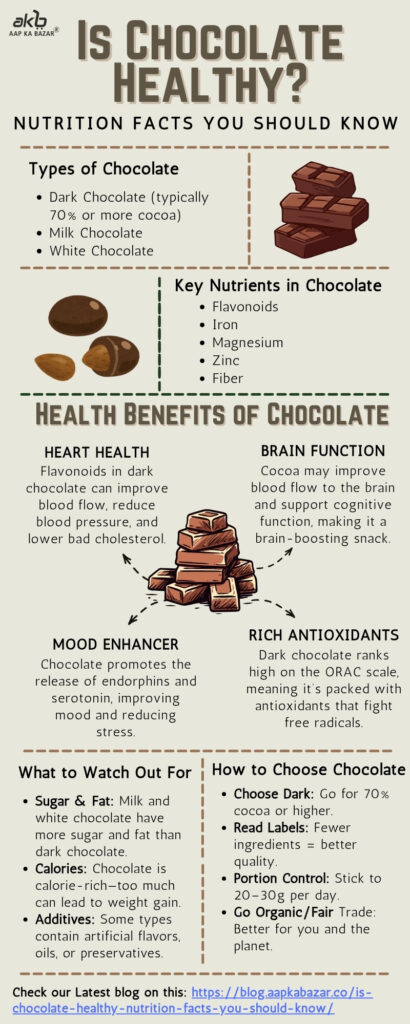Chocolate is one of the world’s most popular treat options, with many modes of enjoyment-in a candy bar, in a dessert, as a hot drinking beverage, or even in some gourmet preparations. But with all that allure for the taste and the emphasis on sugar, people wonder if chocolate is really good for you.
The short answer: it depends on the kind of chocolate, its ingredients, and consumption quantity. This blog will discuss chocolate in terms of nutrition, its benefits, and possible risks, and how best to choose for your next sweet indulgence.
What Makes Chocolate a Potential Health Food?
The fact that the major ingredient in chocolate is cocoa (or cacao) and sometimes helps in making it a health food. Cocoa is loaded with antioxidants, especially flavonoids, which are plant compounds known to reduce inflammation, enhance blood flow, and help fight against chronic diseases.
The higher the cocoa content of chocolate, the higher the contents of the beneficial compounds. That is why many consider dark chocolate with its higher cocoa percentage and low sugar content to be healthier when compared to milk or white chocolate.
Dark vs. Milk vs. White Chocolate: Which Is Better for You?
Let’s break down the differences between the main types of chocolate:
Dark Chocolate
- Contains 70–90% cocoa
- Less sugar and fat
- Rich in flavonoids and antioxidants
- Can offer heart, brain, and mood benefits
Milk Chocolate
- Contains around 10–50% cocoa
- Higher in sugar and milk solids
- Fewer antioxidants
- More calorie-dense and less nutritionally rich
White Chocolate
- Technically not chocolate (contains cocoa butter, not cocoa solids)
- High in sugar and fat
- Offers no flavonoid benefits
Verdict: Dark chocolate is the healthiest choice, followed by milk chocolate. White chocolate offers little to no health value.
Read our relevant blog on Milk Chocolate vs. Dark Chocolate: Which One is Better for You?
Key Nutrients Found in Chocolate

When consumed in moderation, particularly in its dark form, chocolate provides several essential nutrients. Here’s what you’ll find in a quality bar of dark chocolate (per 100g):
| Nutrient | Benefit |
| Iron | Supports red blood cell formation |
| Magnesium | Important for muscle and nerve function |
| Copper | Helps with iron absorption and immune health |
| Manganese | Supports bone health and metabolism |
| Fiber | Aids digestion (present in minimally processed chocolate) |
| Flavonoids | Powerful antioxidants that promote heart health |
Health Benefits of Chocolate (When Eaten in Moderation)
1. Heart Health: Chocolate’s flavonoids open blood vessels, lower blood pressure, lower LDL cholesterol, and elevate HDL cholesterol. Several studies have been found to associate moderate consumption of dark chocolate with a lowered risk of heart disease.
2. Cognition: Cocoa improves brain blood flow and thereby increases memory, attention, and application capacity. Some studies suggest that regular consumption might delay the onset of neurodegenerative disorders like Alzheimer’s.
3. A Good Mood and Mental Health: Chocolate stimulates the release of endorphins, natural feel-good chemicals, and phenylethylamine (PEA), which heighten mood and simulate feelings of being in love.
4. Antioxidant-rich: Dark chocolate offers a rich supply of antioxidants. These are protective elements that shield the cells against damage caused by free radicals. It scores higher on the antioxidant capacity scale (ORAC value) than many fruits like blueberries and acai berries.
The Downside: Sugar, Calories, and Additives
Though the characteristics of chocolate have their advantages, the potential for disadvantages cannot be overlooked-especially with the over-processed types.
- Sugar & Fat: Most milk and white chocolates consist of very high amounts of added sugars and saturated fats, and thus, can lead to weight gain, cause blood sugar spikes, and set one up for metabolic diseases if taken in excess.
- Calories: Calories are something that chocolate is really rich in. Just about any 100 g bar of milk chocolate would pack approximately 500-550 calories, more than enough for a quick adrenaline treat.
- Additives: Preservatives, emulsifiers, flavors, and even hydrogenated oils, along with most undesirable substances, usually find their way into commercial chocolates, thus decreasing their value and possibly negating the healthful effects.
How to Choose a Healthier Chocolate
If you want to enjoy chocolate with less guilt, here are a few quick tips
- Go Dark – Choose chocolate with at least 70 percent cocoa. The better quality the chocolate is, the more antioxidant properties and less sugar it has.
- Read the Label – Look for chocolate that lists cocoa mass, cocoa butter, and cane sugar as primary ingredients. Stay far away from those with artificially flavored chemicals or anything of the sort.
- Keep Track of Serving Sizes – Consume no more than 20 to 30 g of dark chocolate per day—that’s about 2 to 3 small squares.
- Organic or Fair Trade – Buying organic chocolate automatically means fewer pesticides in your chocolate. Fair Trade chocolates are good for ethical sourcing, which ensures better wages and sustainable farming practices, too.
Common Myths About Chocolate and Health
Myth 1: Chocolate Causes Acne
There is no conclusive evidence that chocolate alone causes acne; it is more about one’s overall diet and hormonal changes.
Myth 2: Chocolate Is Addictive Like Drugs
While chocolate may trigger brain chemicals associated with pleasure, it is not chemically addictive in the clinical sense.
Myth 3: Chocolate Has No Nutritional Value
Dark chocolate does, in fact, contain iron, magnesium, and antioxidants-much more than just a treat.
Is Chocolate Really Good for Your Heart and Brain?
Correct-this would be dark chocolate. Really, flavonoids found in cocoa have been associated with cardiovascular and cognitive benefits. Regular consumption of dark chocolate in small amounts with tempered enjoyment is when those benefits are most evident, on an otherwise balanced diet.
The Final Verdict: Should You Include Chocolate in Your Diet?
Absolutely, but. Chocolate, such as dark chocolate, if consumed in moderation, can be good for general nutrition. It has antioxidants and minerals that uplift a person’s mood.
Hence, get this right-if you want to enjoy chocolate yet still garner its benefits without any of its drawbacks:
- Avoid overly processed varieties
- Be mindful of added sugar and calories
- Enjoy it as a treat, not a staple
So go on, have a piece of good-quality dark chocolate. Your heart, brain, and taste buds will surely thank you.



